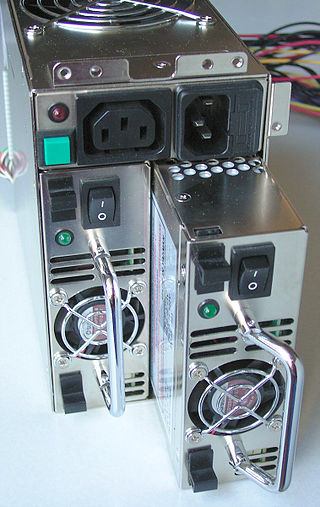See also
- Multiple-alarm fire, a classification of the seriousness of a fire
- All pages with titles containing Fire alarm
A fire alarm is an alarm that warns people about a fire.
Fire alarm may also refer to:
Gent is a shortened form of the word gentleman. It may also refer to:
Reflector may refer to:
Appliance may refer to:

The UL enterprise is a global private safety company headquartered in Northbrook, Illinois, composed of three organizations, UL Research Institutes, UL Standards & Engagement and UL Solutions.
SLC may refer to:

A smoke detector is a device that senses smoke, typically as an indicator of fire. Smoke detectors/Alarms are usually housed in plastic enclosures, typically shaped like a disk about 125 millimetres (5 in) in diameter and 25 millimetres (1 in) thick, but shape and size vary. Smoke can be detected either optically (photoelectric) or by physical process (ionization). Detectors may use one or both sensing methods. Sensitive alarms can be used to detect and deter smoking in banned areas. Smoke detectors in large commercial and industrial buildings are usually connected to a central fire alarm system.

A fire alarm notification appliance is an active fire protection component of a fire alarm system. A notification appliance may use audible, visible, or other stimuli to alert the occupants of a fire or other emergency condition requiring action. Audible appliances have been in use longer than any other method of notification. Initially, all appliances were either electromechanical horns or electric bells, which would later be replaced by electronic sounders. Most of today's appliances produce sound levels between 70 and 100 decibels at 3 ft.

A security alarm is a system designed to detect intrusions, such as unauthorized entry, into a building or other areas, such as a home or school. Security alarms protect against burglary (theft) or property damage, as well as against intruders. Examples include personal systems, neighborhood security alerts, car alarms, and prison alarms.

A fire alarm control panel (FACP), fire alarm control unit (FACU), fire indicator panel (FIP), or simply fire alarm panel is the controlling component of a fire alarm system. The panel receives information from devices designed to detect and report fires, monitors their operational integrity, and provides for automatic control of equipment, and transmission of information necessary to prepare the facility for fire based on a predetermined sequence. The panel may also supply electrical energy to operate any associated initiating device, notification appliance, control, transmitter, or relay. There are four basic types of panels: coded panels, conventional panels, addressable panels, and multiplex systems.

In engineering and systems theory, redundancy is the intentional duplication of critical components or functions of a system with the goal of increasing reliability of the system, usually in the form of a backup or fail-safe, or to improve actual system performance, such as in the case of GNSS receivers, or multi-threaded computer processing.
Building automation (BAS), also known as building management system (BMS) or building energy management system (BEMS), is the automatic centralized control of a building's HVAC, electrical, lighting, shading, access control, security systems, and other interrelated systems. Some objectives of building automation are improved occupant comfort, efficient operation of building systems, reduction in energy consumption, reduced operating and maintaining costs and increased security.
FACP may mean:

A fire alarm system is a building system designed to detect, alert occupants, and alert emergency forces of the presence of fire, smoke, carbon monoxide, or other fire-related emergencies. Fire alarm systems are required in most commercial buildings. They may include smoke detectors, heat detectors, and manual fire alarm activation devices. All components of a fire alarm system are connected to a fire alarm control panel. Fire alarm control panels are usually found in an electrical or panel room. Fire alarm systems generally use visual and audio signalization to warn the occupants of the building. Some fire alarm systems may also disable elevators, which are unsafe to use during a fire under most circumstances.

Fire-Lite Alarms is an American company owned by Honeywell and based in Northford, Connecticut. Fire-Lite manufactures fire alarm control panels (FACPs), EVAC panels, manual pull stations, digital alarm communicators, and annunciators.
LHD can mean:
Alarm may refer to:
An annunciator panel, also known in some aircraft as the Centralized Warning Panel (CWP) or Caution Advisory Panel (CAP), is a group of lights used as a central indicator of status of equipment or systems in an aircraft, industrial process, building or other installation. Usually, the annunciator panel includes a main warning lamp or audible signal to draw the attention of operating personnel to the annunciator panel for abnormal events or condition.
A piston is an engineering component of engines and pumps.
The EN 54 Fire detection and fire alarm systems is a series of European standards that includes product standards and application guidelines for fire detection and fire alarm systems as well as voice alarm systems.
A control unit (CU) is a central, sometimes distributed but clearly distinguishable, part of a mechanism that controls its operation, for example in a computer or a motor vehicle.